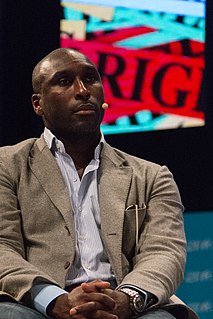A Quote by Sol Campbell
Sometimes you get a team that has almost forgotten how to win. That's maybe fallen away from the standards that should be set at this level. Some are big problems, some of them are small problems.
Related Quotes
We have to recognize we've got some big problems on race, just like we got still big problems on crime, just like we got big problems on just about everything. But we also have to make sure that we've - draw confidence from the progress that we have made, 'cause otherwise, you get into this cycle of cynicism.
It's important in our role as leaders that we use the platform to address issues, to address barriers, to identify best practices for overcoming these challenges with businesses small and large. Maybe there are some public policy issues that we need to address. Maybe some of them are at the federal level and some are at the state or local level.
Why do we focus so intensely on our problems? What draws us to them? Why are they so attractive? They have the magnet power of love: somehow we desire our problems; we are in love with them much as we want to get rid of them . . . Problems sustain us -- maybe that's why they don't go away. What would a life be without them? Completely tranquilized and loveless . . . There is a secret love hiding in each problem
I meet with retired football players. Some are well-dressed, some are well-spoken, but when you talk to them personally, they will admit to you that they are having problems. But they are managing their problems. They have impaired memory, they're having mood problems. They are being treated by their psychiatrists.
Well, Mr Obama inherited probably the biggest inventory of problems, certainly foreign policy problems, than any American president ever has. I think the entire inventory of problems that he inherited is probably as big overall as any president, certainly since Franklin Roosevelt and maybe, in some cases, worse.
I feel like a small battlefield in which the problems, or some of the problems, of our time are being fought out. All one can hope to do is keep oneself humbly available, to allow oneself to be a battlefield. After all, the problems must be accommodated, have somewhere to struggle and come to rest and we, poor little humans, must put our inner space at their service and not run away.
The confidence in the unlimited power of science is only too often based on a false belief that the scientific method consists in the application of a ready-made technique, or in imitating the form rather than the substance of scientific procedure, as if one needed only to follow some cooking recipes to solve all social problems. It sometimes almost seems as if the techniques of science were more easily learnt than the thinking that shows us what the problems are and how to approach them.


































